Corporation Law: Duties of Directors and Legal Responsibilities
VerifiedAdded on 2021/06/14
|6
|1040
|48
Homework Assignment
AI Summary
This Corporation Law assignment addresses two key issues concerning director's duties and liabilities under the Corporations Act 2001. The first issue involves a company facing insolvency, with directors prioritizing creditor payments and incurring unpaid tax obligations. The analysis explores potential breaches of statutory obligations, focusing on Section 588G and the consequences of insolvent trading, including civil and criminal liabilities, and the role of ASIC. The second issue examines whether directors of CloudTech can legally pursue a former director, Alexandra, for a contract between her company, Banger Pty Ltd, and Gnosis Records, and for her use of a client list belonging to CloudTech. The analysis applies the principles of Salomon v A Salomon and Co Ltd and Section 183 of the Corporations Act, determining the legality of Alexandra's actions and the potential for legal action against her. The assignment concludes with recommendations on the liabilities of the directors and the scope of legal action that can be taken.
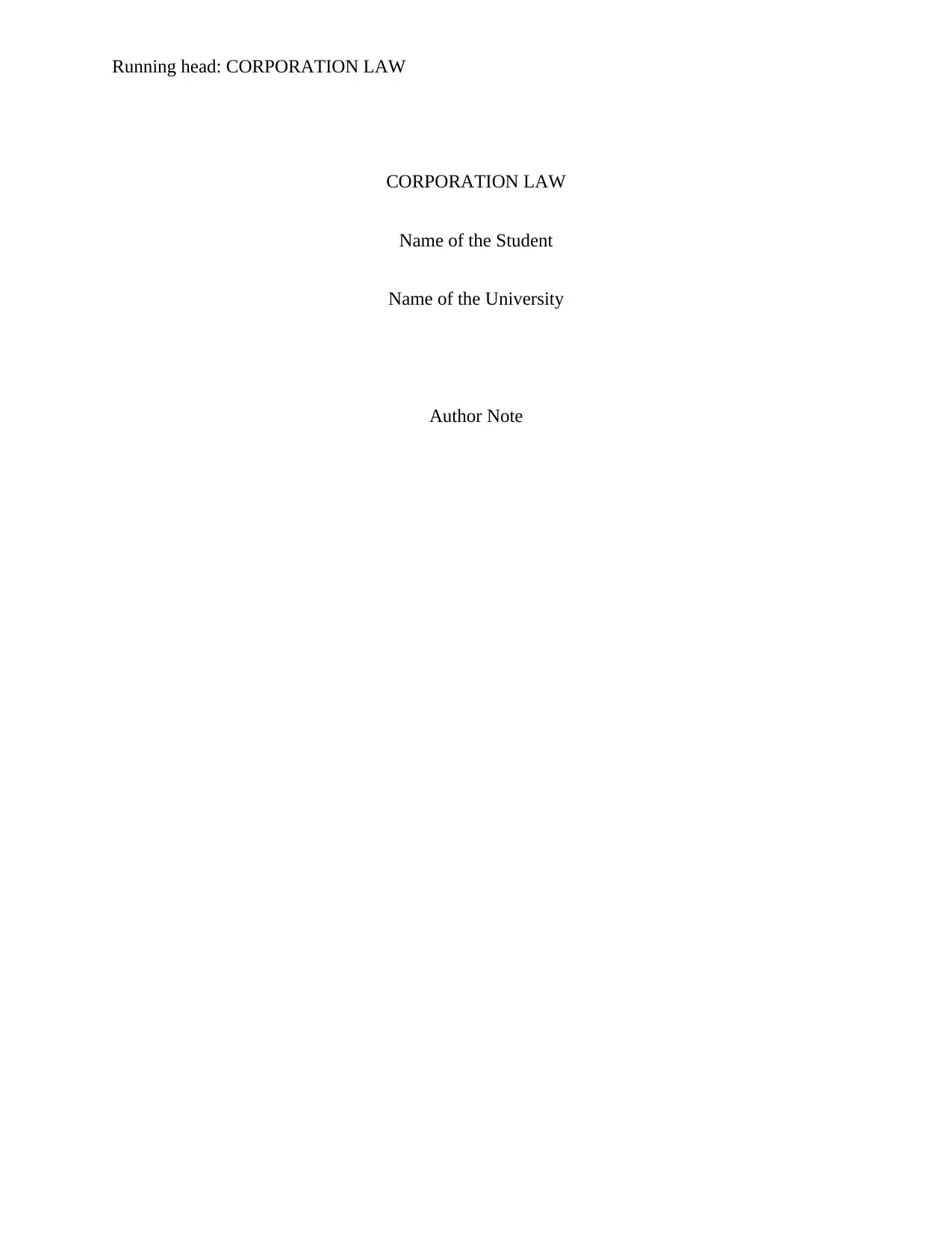
Running head: CORPORATION LAW
CORPORATION LAW
Name of the Student
Name of the University
Author Note
CORPORATION LAW
Name of the Student
Name of the University
Author Note
Paraphrase This Document
Need a fresh take? Get an instant paraphrase of this document with our AI Paraphraser
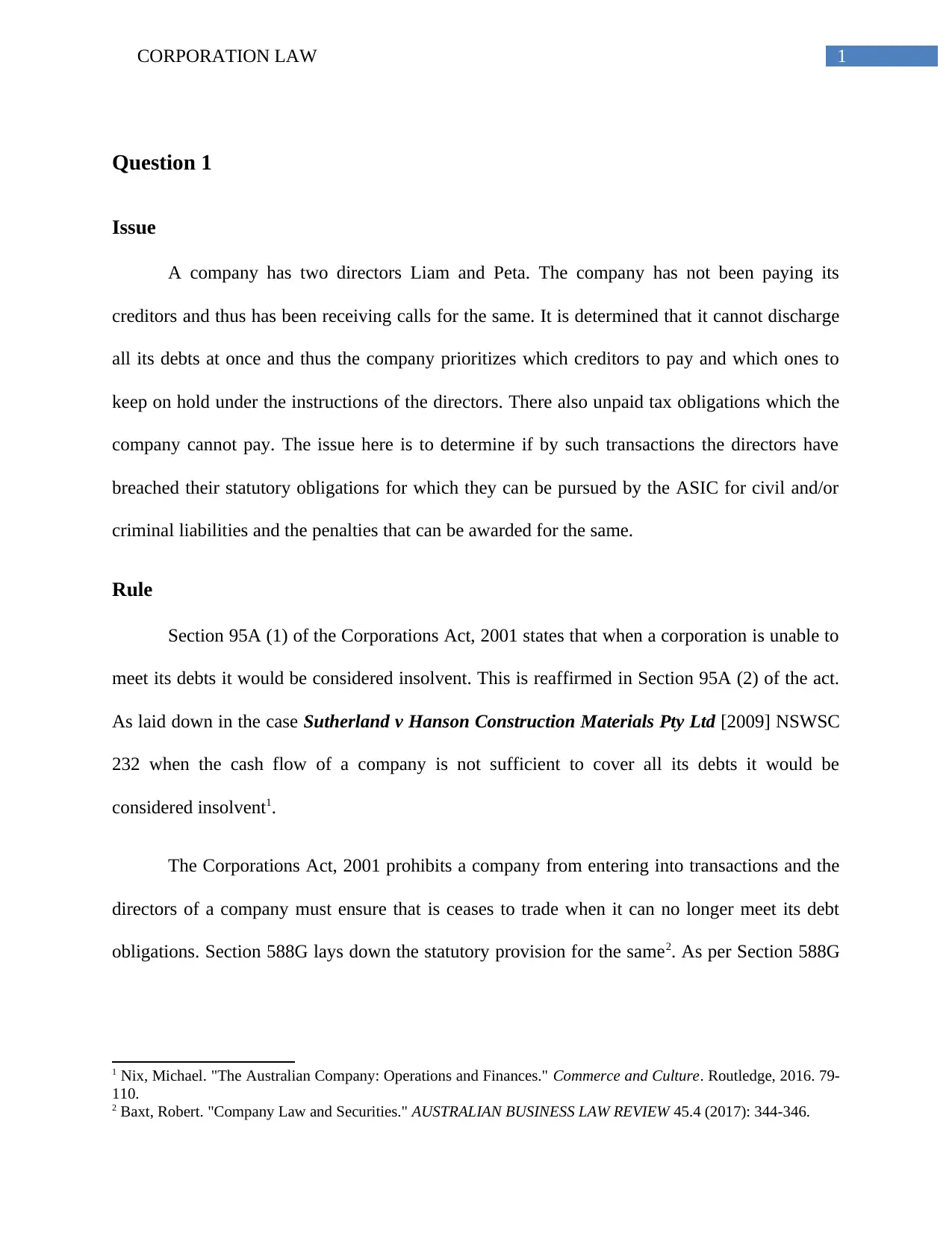
1CORPORATION LAW
Question 1
Issue
A company has two directors Liam and Peta. The company has not been paying its
creditors and thus has been receiving calls for the same. It is determined that it cannot discharge
all its debts at once and thus the company prioritizes which creditors to pay and which ones to
keep on hold under the instructions of the directors. There also unpaid tax obligations which the
company cannot pay. The issue here is to determine if by such transactions the directors have
breached their statutory obligations for which they can be pursued by the ASIC for civil and/or
criminal liabilities and the penalties that can be awarded for the same.
Rule
Section 95A (1) of the Corporations Act, 2001 states that when a corporation is unable to
meet its debts it would be considered insolvent. This is reaffirmed in Section 95A (2) of the act.
As laid down in the case Sutherland v Hanson Construction Materials Pty Ltd [2009] NSWSC
232 when the cash flow of a company is not sufficient to cover all its debts it would be
considered insolvent1.
The Corporations Act, 2001 prohibits a company from entering into transactions and the
directors of a company must ensure that is ceases to trade when it can no longer meet its debt
obligations. Section 588G lays down the statutory provision for the same2. As per Section 588G
1 Nix, Michael. "The Australian Company: Operations and Finances." Commerce and Culture. Routledge, 2016. 79-
110.
2 Baxt, Robert. "Company Law and Securities." AUSTRALIAN BUSINESS LAW REVIEW 45.4 (2017): 344-346.
Question 1
Issue
A company has two directors Liam and Peta. The company has not been paying its
creditors and thus has been receiving calls for the same. It is determined that it cannot discharge
all its debts at once and thus the company prioritizes which creditors to pay and which ones to
keep on hold under the instructions of the directors. There also unpaid tax obligations which the
company cannot pay. The issue here is to determine if by such transactions the directors have
breached their statutory obligations for which they can be pursued by the ASIC for civil and/or
criminal liabilities and the penalties that can be awarded for the same.
Rule
Section 95A (1) of the Corporations Act, 2001 states that when a corporation is unable to
meet its debts it would be considered insolvent. This is reaffirmed in Section 95A (2) of the act.
As laid down in the case Sutherland v Hanson Construction Materials Pty Ltd [2009] NSWSC
232 when the cash flow of a company is not sufficient to cover all its debts it would be
considered insolvent1.
The Corporations Act, 2001 prohibits a company from entering into transactions and the
directors of a company must ensure that is ceases to trade when it can no longer meet its debt
obligations. Section 588G lays down the statutory provision for the same2. As per Section 588G
1 Nix, Michael. "The Australian Company: Operations and Finances." Commerce and Culture. Routledge, 2016. 79-
110.
2 Baxt, Robert. "Company Law and Securities." AUSTRALIAN BUSINESS LAW REVIEW 45.4 (2017): 344-346.
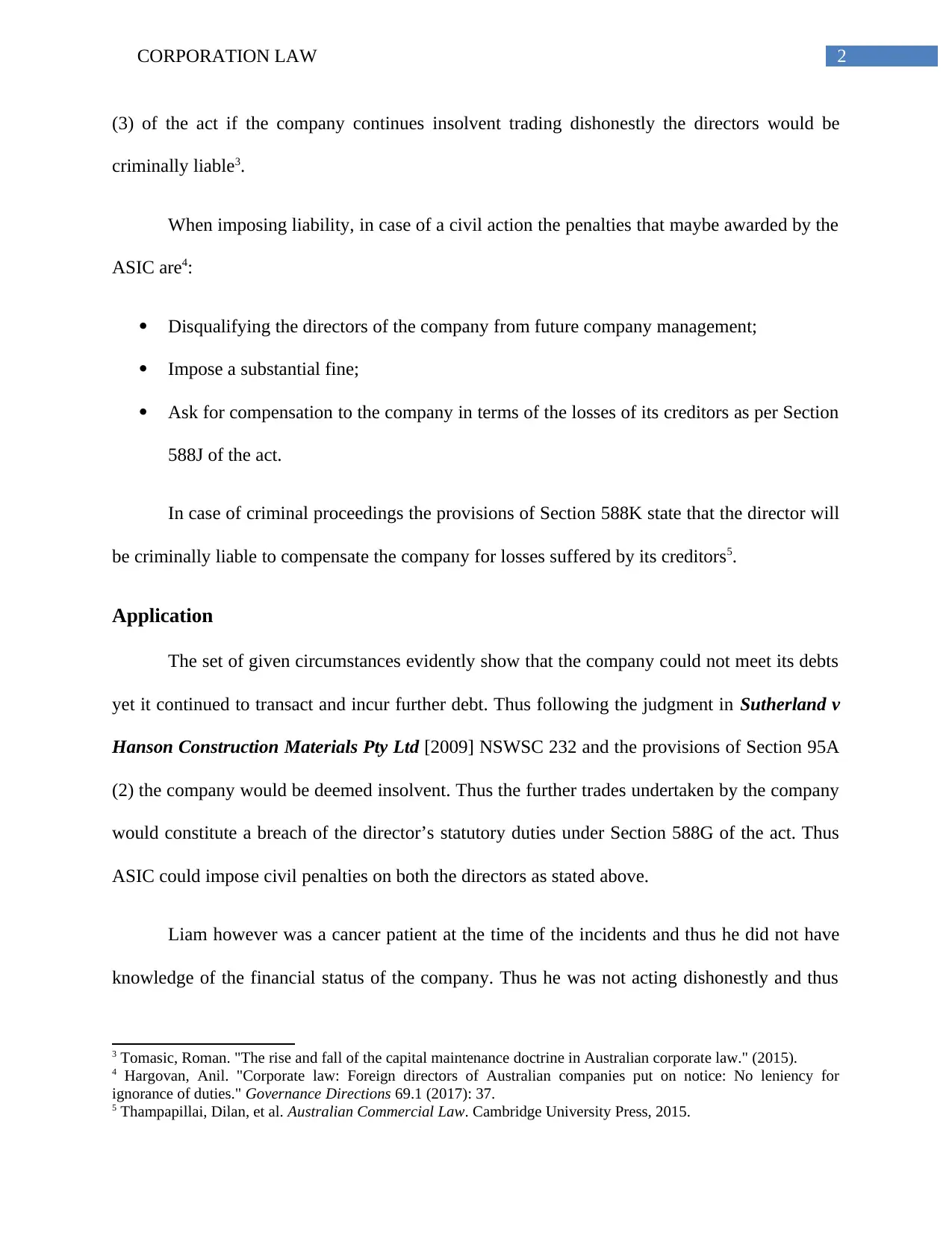
2CORPORATION LAW
(3) of the act if the company continues insolvent trading dishonestly the directors would be
criminally liable3.
When imposing liability, in case of a civil action the penalties that maybe awarded by the
ASIC are4:
Disqualifying the directors of the company from future company management;
Impose a substantial fine;
Ask for compensation to the company in terms of the losses of its creditors as per Section
588J of the act.
In case of criminal proceedings the provisions of Section 588K state that the director will
be criminally liable to compensate the company for losses suffered by its creditors5.
Application
The set of given circumstances evidently show that the company could not meet its debts
yet it continued to transact and incur further debt. Thus following the judgment in Sutherland v
Hanson Construction Materials Pty Ltd [2009] NSWSC 232 and the provisions of Section 95A
(2) the company would be deemed insolvent. Thus the further trades undertaken by the company
would constitute a breach of the director’s statutory duties under Section 588G of the act. Thus
ASIC could impose civil penalties on both the directors as stated above.
Liam however was a cancer patient at the time of the incidents and thus he did not have
knowledge of the financial status of the company. Thus he was not acting dishonestly and thus
3 Tomasic, Roman. "The rise and fall of the capital maintenance doctrine in Australian corporate law." (2015).
4 Hargovan, Anil. "Corporate law: Foreign directors of Australian companies put on notice: No leniency for
ignorance of duties." Governance Directions 69.1 (2017): 37.
5 Thampapillai, Dilan, et al. Australian Commercial Law. Cambridge University Press, 2015.
(3) of the act if the company continues insolvent trading dishonestly the directors would be
criminally liable3.
When imposing liability, in case of a civil action the penalties that maybe awarded by the
ASIC are4:
Disqualifying the directors of the company from future company management;
Impose a substantial fine;
Ask for compensation to the company in terms of the losses of its creditors as per Section
588J of the act.
In case of criminal proceedings the provisions of Section 588K state that the director will
be criminally liable to compensate the company for losses suffered by its creditors5.
Application
The set of given circumstances evidently show that the company could not meet its debts
yet it continued to transact and incur further debt. Thus following the judgment in Sutherland v
Hanson Construction Materials Pty Ltd [2009] NSWSC 232 and the provisions of Section 95A
(2) the company would be deemed insolvent. Thus the further trades undertaken by the company
would constitute a breach of the director’s statutory duties under Section 588G of the act. Thus
ASIC could impose civil penalties on both the directors as stated above.
Liam however was a cancer patient at the time of the incidents and thus he did not have
knowledge of the financial status of the company. Thus he was not acting dishonestly and thus
3 Tomasic, Roman. "The rise and fall of the capital maintenance doctrine in Australian corporate law." (2015).
4 Hargovan, Anil. "Corporate law: Foreign directors of Australian companies put on notice: No leniency for
ignorance of duties." Governance Directions 69.1 (2017): 37.
5 Thampapillai, Dilan, et al. Australian Commercial Law. Cambridge University Press, 2015.
⊘ This is a preview!⊘
Do you want full access?
Subscribe today to unlock all pages.

Trusted by 1+ million students worldwide
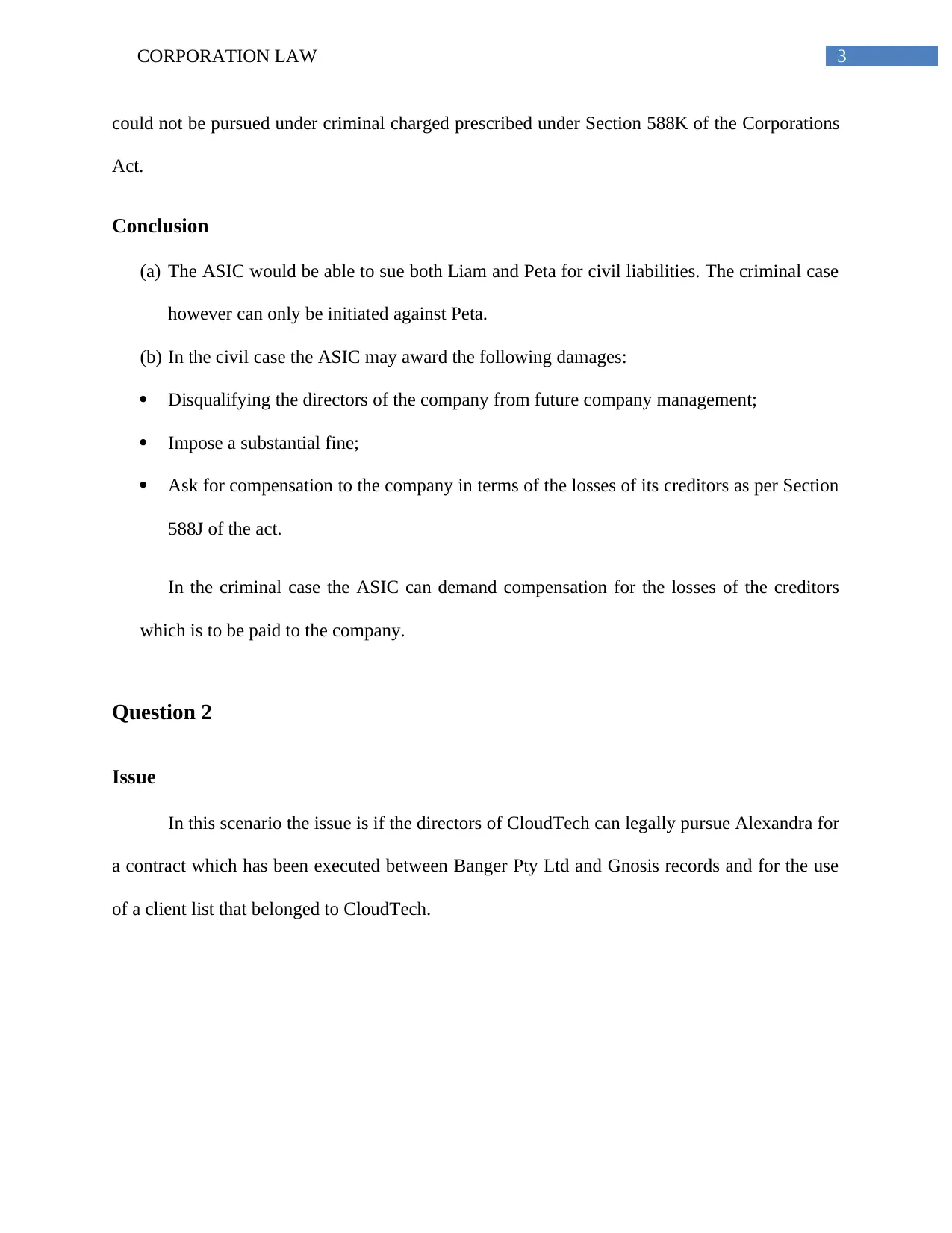
3CORPORATION LAW
could not be pursued under criminal charged prescribed under Section 588K of the Corporations
Act.
Conclusion
(a) The ASIC would be able to sue both Liam and Peta for civil liabilities. The criminal case
however can only be initiated against Peta.
(b) In the civil case the ASIC may award the following damages:
Disqualifying the directors of the company from future company management;
Impose a substantial fine;
Ask for compensation to the company in terms of the losses of its creditors as per Section
588J of the act.
In the criminal case the ASIC can demand compensation for the losses of the creditors
which is to be paid to the company.
Question 2
Issue
In this scenario the issue is if the directors of CloudTech can legally pursue Alexandra for
a contract which has been executed between Banger Pty Ltd and Gnosis records and for the use
of a client list that belonged to CloudTech.
could not be pursued under criminal charged prescribed under Section 588K of the Corporations
Act.
Conclusion
(a) The ASIC would be able to sue both Liam and Peta for civil liabilities. The criminal case
however can only be initiated against Peta.
(b) In the civil case the ASIC may award the following damages:
Disqualifying the directors of the company from future company management;
Impose a substantial fine;
Ask for compensation to the company in terms of the losses of its creditors as per Section
588J of the act.
In the criminal case the ASIC can demand compensation for the losses of the creditors
which is to be paid to the company.
Question 2
Issue
In this scenario the issue is if the directors of CloudTech can legally pursue Alexandra for
a contract which has been executed between Banger Pty Ltd and Gnosis records and for the use
of a client list that belonged to CloudTech.
Paraphrase This Document
Need a fresh take? Get an instant paraphrase of this document with our AI Paraphraser
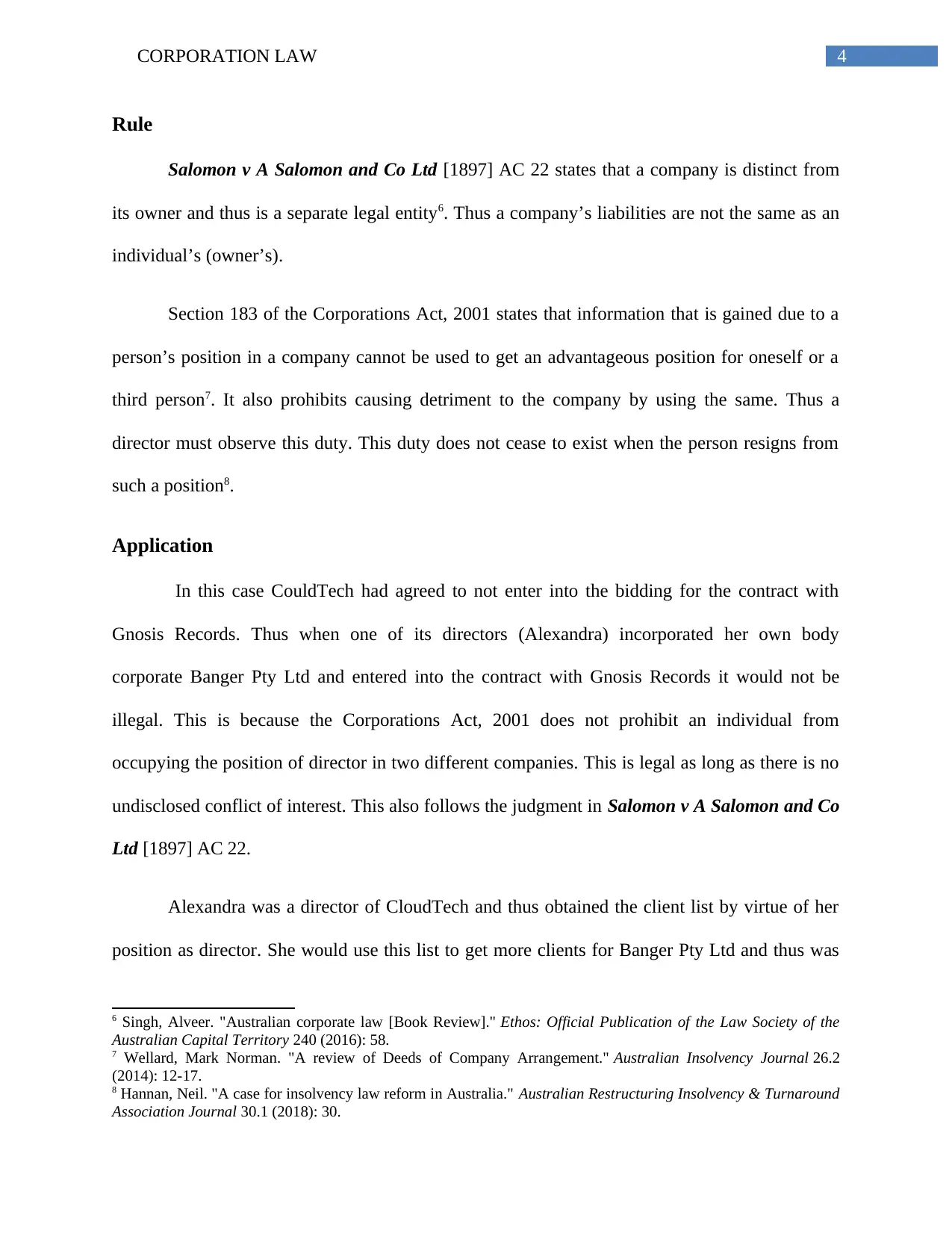
4CORPORATION LAW
Rule
Salomon v A Salomon and Co Ltd [1897] AC 22 states that a company is distinct from
its owner and thus is a separate legal entity6. Thus a company’s liabilities are not the same as an
individual’s (owner’s).
Section 183 of the Corporations Act, 2001 states that information that is gained due to a
person’s position in a company cannot be used to get an advantageous position for oneself or a
third person7. It also prohibits causing detriment to the company by using the same. Thus a
director must observe this duty. This duty does not cease to exist when the person resigns from
such a position8.
Application
In this case CouldTech had agreed to not enter into the bidding for the contract with
Gnosis Records. Thus when one of its directors (Alexandra) incorporated her own body
corporate Banger Pty Ltd and entered into the contract with Gnosis Records it would not be
illegal. This is because the Corporations Act, 2001 does not prohibit an individual from
occupying the position of director in two different companies. This is legal as long as there is no
undisclosed conflict of interest. This also follows the judgment in Salomon v A Salomon and Co
Ltd [1897] AC 22.
Alexandra was a director of CloudTech and thus obtained the client list by virtue of her
position as director. She would use this list to get more clients for Banger Pty Ltd and thus was
6 Singh, Alveer. "Australian corporate law [Book Review]." Ethos: Official Publication of the Law Society of the
Australian Capital Territory 240 (2016): 58.
7 Wellard, Mark Norman. "A review of Deeds of Company Arrangement." Australian Insolvency Journal 26.2
(2014): 12-17.
8 Hannan, Neil. "A case for insolvency law reform in Australia." Australian Restructuring Insolvency & Turnaround
Association Journal 30.1 (2018): 30.
Rule
Salomon v A Salomon and Co Ltd [1897] AC 22 states that a company is distinct from
its owner and thus is a separate legal entity6. Thus a company’s liabilities are not the same as an
individual’s (owner’s).
Section 183 of the Corporations Act, 2001 states that information that is gained due to a
person’s position in a company cannot be used to get an advantageous position for oneself or a
third person7. It also prohibits causing detriment to the company by using the same. Thus a
director must observe this duty. This duty does not cease to exist when the person resigns from
such a position8.
Application
In this case CouldTech had agreed to not enter into the bidding for the contract with
Gnosis Records. Thus when one of its directors (Alexandra) incorporated her own body
corporate Banger Pty Ltd and entered into the contract with Gnosis Records it would not be
illegal. This is because the Corporations Act, 2001 does not prohibit an individual from
occupying the position of director in two different companies. This is legal as long as there is no
undisclosed conflict of interest. This also follows the judgment in Salomon v A Salomon and Co
Ltd [1897] AC 22.
Alexandra was a director of CloudTech and thus obtained the client list by virtue of her
position as director. She would use this list to get more clients for Banger Pty Ltd and thus was
6 Singh, Alveer. "Australian corporate law [Book Review]." Ethos: Official Publication of the Law Society of the
Australian Capital Territory 240 (2016): 58.
7 Wellard, Mark Norman. "A review of Deeds of Company Arrangement." Australian Insolvency Journal 26.2
(2014): 12-17.
8 Hannan, Neil. "A case for insolvency law reform in Australia." Australian Restructuring Insolvency & Turnaround
Association Journal 30.1 (2018): 30.
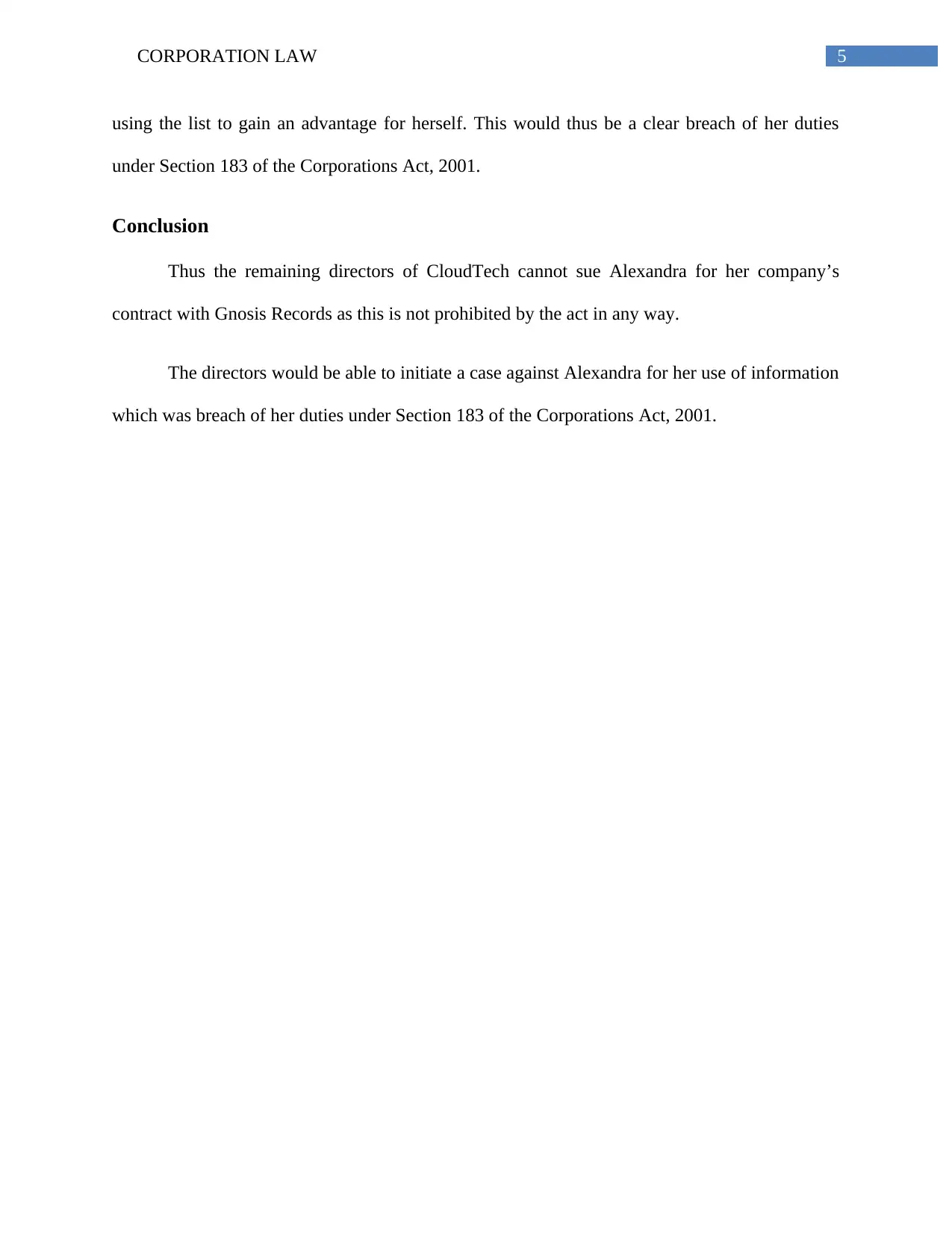
5CORPORATION LAW
using the list to gain an advantage for herself. This would thus be a clear breach of her duties
under Section 183 of the Corporations Act, 2001.
Conclusion
Thus the remaining directors of CloudTech cannot sue Alexandra for her company’s
contract with Gnosis Records as this is not prohibited by the act in any way.
The directors would be able to initiate a case against Alexandra for her use of information
which was breach of her duties under Section 183 of the Corporations Act, 2001.
using the list to gain an advantage for herself. This would thus be a clear breach of her duties
under Section 183 of the Corporations Act, 2001.
Conclusion
Thus the remaining directors of CloudTech cannot sue Alexandra for her company’s
contract with Gnosis Records as this is not prohibited by the act in any way.
The directors would be able to initiate a case against Alexandra for her use of information
which was breach of her duties under Section 183 of the Corporations Act, 2001.
⊘ This is a preview!⊘
Do you want full access?
Subscribe today to unlock all pages.

Trusted by 1+ million students worldwide
1 out of 6
Related Documents
Your All-in-One AI-Powered Toolkit for Academic Success.
+13062052269
info@desklib.com
Available 24*7 on WhatsApp / Email
![[object Object]](/_next/static/media/star-bottom.7253800d.svg)
Unlock your academic potential
Copyright © 2020–2026 A2Z Services. All Rights Reserved. Developed and managed by ZUCOL.





